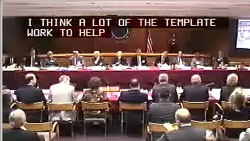Media Security and Reliability Council adopts additional best practice recommendations
The professional video industry's #1 source for news, trends and product and tech information. Sign up below.
You are now subscribed
Your newsletter sign-up was successful
The Media Security and Reliability Council (MSRC) Tuesday adopted 18 national and two local best practices related to response and recovery from natural and man-made disasters to add to the 63 best practices it approved in December.

The FCC met yesterday in Washington D.C. to adopt 18 national and two local best practices related to response and recovery from natural and man-made disasters.
The new proposals grew out of an event in Tampa, Fla., sponsored by the council’s Public Communications and Safety Working Group where many of the previously adopted best practices were taken for a “test drive,” in the words of committee chair John Eck, president of Network Operations for NBC.
Among the new best practices are:
- National television networks and news channels should have appropriate physical security, augmented by security personnel and/or video surveillance at their key facilities, including studios/newsrooms, network origination and control centers and satellite communications facilities.
- National television networks and news channels should take appropriate measures to provide backup power capabilities for their key facilities, including studios/newsrooms, network origination and control centers and satellite communications facilities.
- National television networks and news channels should ensure that they have robust and redundant means of communications with their local affiliates.
- National television networks and news channels should ensure that they have backup satellite phones or fiber links with their news origination centers.
- National television networks and news channels should plan to have emergency origination capability at a separate location from their primary studio (e.g., backup studio, SNG remote, etc).
- During government declared emergency conditions television news networks should consider the possibility of a backup carriage plan with other non-news networks to gain cost-effective additional geographic diversity.
- Local Public/Private Partnerships should jointly examine their key suppliers to ensure that critical resources will have sufficient capacity to meet the needs of all of the organizations that may be relying on them during an emergency.
- Local Public/Private Partnerships should jointly examine their key suppliers’ emergency operations and recovery plans to ensure that they will be able to provide the needed materials and services to local media companies during an emergency.
Tuesday’s MSRC meeting was the fifth and final gathering of the group under its two-year charter. In his closing statements, FCC Chairman Michael Powell thanked council members for their work and warned the media that they may likely be the target of future terror attacks.
Powell also announced that David Barrett, president and CEO of Hearst-Argyle Television, will be the incoming chairman of the new Media Security and Reliability Council.
For more information, please visit: www.fcc.gov.
The professional video industry's #1 source for news, trends and product and tech information. Sign up below.
